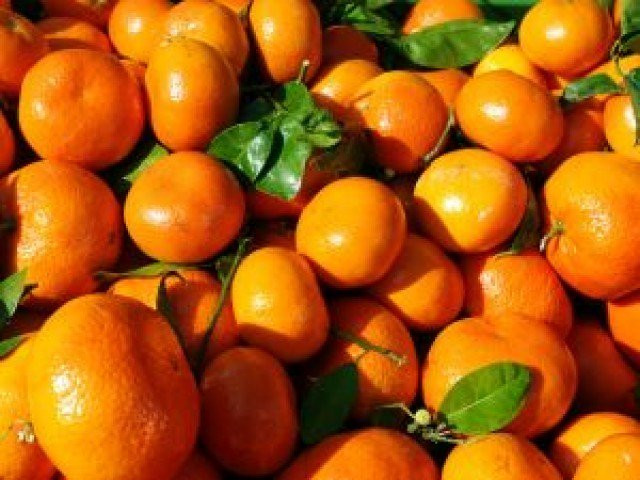Pakistan’s California faces challenges in kinnow exports
Based on its taste, juice, size, Sargodha’s kinnow are regarded best in the world

PHOTO: FILE
In the 1960s, plants of kinnow were brought from the American state of California to be bred on an experimental basis. This experiment proved to be so successful that the city of Sargodha, thanks to its abundance of kinnows, is called Pakistan’s California. Based on its taste, juice quality, aroma and size, the kinnow produced in Sargodha are counted among the best citrus fruits in the world.
Kinnow are cultivated on an area of 176.5 hectares which produces around 1.8 million tonnes of fruit, annually. Apart from Sargodha, kinnow is also cultivated in various other parts of the country. However, around 96 per cent of the total production takes place in the district.
Sargodha Chamber of Commerce and Industry (SCCI) officials revealed that out of the 1.8 million tonnes of production last year, only 350,000 tonnes of kinnow were exported. A total of 250,000 tonnes were shipped overseas while 100,000 tonnes of kinnows are sent to neighbouring countries via land routes.
In Sargodha and the suburbs, there are 160 small and large units for kinnow processing where the shelf life of fruit is enhanced by grading and finishing, after which the fruit is ready for export.
SCCI President Mazhar Ahmad Malik said that at present, kinnows are being exported to a number of countries, including Indonesia, Russia, United Arab Emirates, Afghanistan, Ukraine, Sri Lanka, Singapore, Malaysia, Bangladesh, Kuwait, Saudi Arabia, Canada, Oman, Qatar, Bahrain and Muscat. This brings in foreign exchange of $140 million, but the exchange can be increased to $200 million to $250 million, he added. For this purpose, both the government and farmers will have to adopt innovative methods of farming while cultivation, he maintained.
Kinnow Exporter Rao Abdul Qayyum explained that 80% of Pakistani kinnow does not make it to the international market due to the absence of post-harvest technology and various diseases developed in the citrus fruit.
There is a dire need for the government to take progressive measures which would help us in extracting disease-free fruits, he elaborated. “Kinnow is an asset for the country and we can reach our export target of $200 million by improving fruit quality.”
Citrus Research Institute Director Mohammed Nawaz Maken asserted that various institutes are conducting research to find ways to increase kinnow export. University of Agriculture, Faisalabad, College of Agriculture, University of Sargodha and our research institute are very important in this regard, he added. “We have succeeded in producing seedless kinnows, whose plants will be distributed among farmers, soon.”
The fruit of this variety will soon be available in the market and seedless kinnows will help expand market access to Europe. According to the director, various innovative methods are also being adopted in regard to protect kinnows from diseases, which is increasing production of the fruit every year.
Although Kinnow is being produced in the district in thousands of tonnes, only a small proportion of it is being exported. Most of the produce is sold in the local market therefore the value addition of this most important fruit is lesser.
In Sargodha, there are only two industrial units that manufacture kinnow juice. Reportedly, no unit utilises the peel of the citrus fruits. Even its pulp is not being utilised in any products such as cosmetics, jam, jelly, marmalade and others. Since no industrial unit is present to utilise the fruit completely, farmers are unable to benefit from the fruit’s production.
The SCCI president suggested that in order to establish a value addition, industrial unit in Sargodha, it is essential to invite foreign investors to invest in this sector along with government’s initiatives. “This will not only increase our foreign exchange reserves but also benefit farmers who will receive their due reward for their hard work.
Published in The Express Tribune, January 13th, 2020.



















COMMENTS
Comments are moderated and generally will be posted if they are on-topic and not abusive.
For more information, please see our Comments FAQ